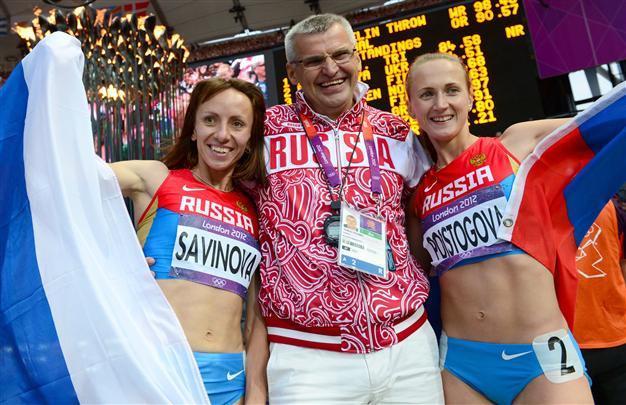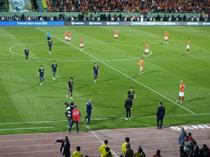Russia responds as doping scandal threatens to spread
MOSCOW

A file picture taken on August 11, 2012 shows Russia's gold medalist Mariya Savinova (L) celebrating with Russia's bronze medalist Ekaterina Poistogova (R), and Russian coach Vladimir Kazarin, at the end of the women's 800m final at the athletics event of the London 2012 Olympic Games. AFP Photo
Russia rejected on Nov. 10 explosive accusations of doping and corruption and promised a rapid response to avoid suspension from the 2016 Olympics due to the scandal that threatens to spread far beyond the borders of Russia and athletics.“Until any proof has been put forward, it is hard to accept any accusations as they seem rather groundless,” Kremlin spokesman Dmitry Peskov said.
Meanwhile, the Moscow anti-doping laboratory was stripped of its accreditation by the World Anti-Doping Agency (WADA) in the first concrete measure taken since the publishing of a damning report by a WADA independent commission.
Athletics was rocked by allegations of Russian “state-sponsored” doping contained in the report published on Nov. 9.
IAAF President Sebastian Coe has given the Russian athletics federation (ARAF) “until the end of the week” to respond or risk possible suspension.
Despite the Kremlin’s dismissive reaction, ARAF assured Coe that it would contact the IAAF “in the very near future” outlining its anti-doping program and “its reaction to the deductions and conclusions” in WADA’s report.
Calls for Russia, fourth in the 2012 London Olympics medal table, to be banned from next year’s Olympic Games are growing.
U.K. Athletics chief Ed Warner told BBC Radio 4: “Lord Coe... says that his [IAAF] council is meeting on Friday or Saturday to consider sanctioning Russia and possibly to suspend them. My strong advice would be: you’ve absolutely got to do that.”
That view was echoed by Australia’s National Olympic Committee.
“We would very much support Russian track and field athletes not being allowed to compete in Rio if their federation is not code-compliant to WADA,” the 2016 Australian Olympic team’s chef de mission, Kitty Chiller, said in Sydney. “If Russia is not in Rio, I think the reputation of athletics will be enhanced because the public will know every athlete competing is clean and is competing in the true spirit of the Olympic Games.”
The crisis engulfing the sport long-viewed as the flagship of the Olympic Games comes hot on the heels of FIFA’s own corruption turmoil.
And worryingly according to WADA, the athletics scandal is by no means confined to Russia nor athletics.
“Russia is not the only country, nor athletics the only sport, facing the problem of orchestrated doping in sport,” warned the report, which was triggered by a documentary by German broadcaster ARD last December.
“We certainly do not think that Russia is the only country with a doping problem and we don’t think athletics is the only sport with a doping problem. It seems pretty clear from both the ARD program and subsequent developments that Kenya has a real problem. It’s been very slow to acknowledge that there is a problem,” said WADA’s independent commission chairman, Dick Pound. “If they don’t do a good job [investigating doping], then I think somebody else will do a job for them.”
According to several anti-doping specialists, the risk of abuse is especially high in countries with strong rulers.
“Frauds like this can only be state-run with secret service involvement,” a specialist who wished to remain anonymous told AFP.
He raised the case of China, recalling that in the build-up to the 2008 Beijing Olympics, a German reporter posed as a swimming coach in search of finding ways to improve performance. “He didn’t have to wait long before go-betweens were offering him genetic manipulation kits for 30,000 euros.”
ARD’s documentary claimed that a third of the 146 world and Olympic medals awarded between 2001 and the 2012 London Olympics, featuring 18 Kenyans, were tainted by suspicions of doping.
And of 5,000 athletes of various nationalities tested during this period, 800 returned suspect samples, according to ARD.
Russian former athlete and doping whistleblower Yulia Stepanova told ARD in comments included in WADA’s report: “There were swimmers, coaches and athletes from other sports, long distance skiers...”
Among the other recommendations, the WADA report called for five Russian athletes – including 800m Olympic winner Mariya Savinova – to be given lifetime bans, suggesting the presence of doped athletes had “sabotaged” the 2012 Games in London.
Moscow’s sports minister defended his country, saying it had done everything that was asked by international organizations.
“We invested colossal funds into building a laboratory, we did everything that was recommended to us... we pay a million dollars every year to WADA... I don’t understand, what else do we need to do so that somebody says that we comply?” Vitaly Mutko told state television.
Contrary to some expectations, Pound’s report did not address allegations of IAAF officials receiving bribes to cover up positive tests for athletes, including potential medal winners from past Olympic Games.
Former President Lamine Diack was among three officials charged last week with corruption.
Pound meanwhile said further evidence of misconduct, including among potentially “rogue” individuals within the IAAF, is expected by the end of the year.
















